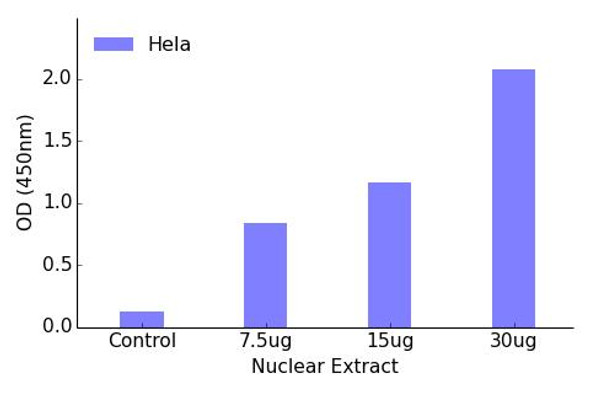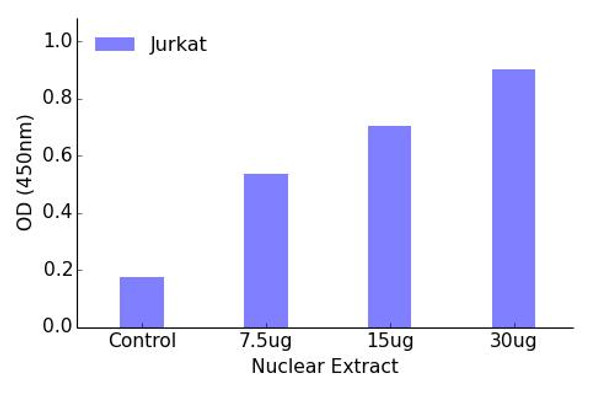Description
| Product Name: | HSF1 (Phospho-Ser303) Transcription Factor Activity Assay |
| Product Code: | TFAB00034 |
| Target: | HSF1 (Phospho-Ser303) |
| Synonyms: | Heat shock transcription factor 1 |
| Reactivity: | Human, Mouse, Rat |
| Sample Types: | Nuclear or cell lysates |
The Assay Genie HSF1 (Phospho-Ser303) transcription factor activity assay allows for the detection and qualitative analysis of HSF1 (Phospho-Ser303) active transcription factors in eukaryotic nuclear or cell lysates.
Assay Genie ELISA kits are designed to significantly reduce experiment time and ensure sensitivity and flexibility for high-throughput screening.
| Assay Time: | 4.5 hours |
| Detection Method: | Colorimetric 450 nm |
| Size: | 12 x 8-Well Microstrips |
| Storage: | 4°C for 6 months |
| UniProt Protein Function: | HSF1: a transcription factor that specifically binds heat shock promoter elements (HSE) and activates transcription. Induced in response to heat, heavy metals, and oxidative stress. In higher eukaryotes, HSF is unable to bind to HSEs unless the cells are stressed. Becomes phosphorylated in response to stress, forming homotrimers that bind DNA and activate transcription. Phosphorylation by PLK1 enhances nuclear translocation, and phosphorylation by CaMKII enhances transactivation. Phosphorylation by GSK3 and ERK1 induces binding by 14-3-3 and sequestration in the cytoplasm. In addition, during attenuation from the heat shock response, HSF1 is repressed by direct binding of Hsp70, HSP40, and HSF binding protein 1 (HSBP1). Four alternatively spliced isoforms have been described. |
| UniProt Protein Details: | Protein type:Transcription factor; DNA-binding Chromosomal Location of Human Ortholog: 8q24.3 Cellular Component: nucleoplasm; protein complex; pronucleus; cytoplasm; cytosol Molecular Function:protein binding; chromatin binding; transcription factor activity Biological Process: negative regulation of cell proliferation; embryonic placenta development; embryonic process involved in female pregnancy; mRNA transcription; female meiosis; positive regulation of transcription from RNA polymerase II promoter; response to lipopolysaccharide; defense response; spermatogenesis; negative regulation of tumor necrosis factor production; negative regulation of transcription from RNA polymerase II promoter; positive regulation of multicellular organism growth; protein amino acid phosphorylation |
| NCBI Summary: | The product of this gene is a heat-shock transcription factor. Transcription of heat-shock genes is rapidly induced after temperature stress. Hsp90, by itself and/or associated with multichaperone complexes, is a major repressor of this gene. [provided by RefSeq, Jul 2008] |
| UniProt Code: | Q00613 |
| NCBI GenInfo Identifier: | 462333 |
| NCBI Gene ID: | 3297 |
| NCBI Accession: | Q00613.1 |
| UniProt Secondary Accession: | Q00613,Q53XT4, A8K4L0, A8MW26, |
| UniProt Related Accession: | Q00613 |
| Molecular Weight: | 529 |
| NCBI Full Name: | Heat shock factor protein 1 |
| NCBI Synonym Full Names: | heat shock transcription factor 1 |
| NCBI Official Symbol: | HSF1 |
| NCBI Official Synonym Symbols: | HSTF1 |
| NCBI Protein Information: | heat shock factor protein 1; HSF 1; HSTF 1 |
| UniProt Protein Name: | Heat shock factor protein 1 |
| UniProt Synonym Protein Names: | Heat shock transcription factor 1; HSTF 1 |
| Protein Family: | Heat shock factor protein |
| UniProt Gene Name: | HSF1 |
| UniProt Entry Name: | HSF1_HUMAN |






